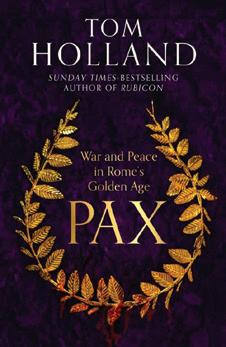1 minute read
JAMES STOURTON
In conversation with Julian Glover
Wednesday 12 July 10am – 11am
Pavilion Arts Centre £12
Heritage: A History of How We Conserve Our Past

What is heritage? When was it invented? What is its place in the world today? What is its place tomorrow?
Heritage is all around us: millions belong to its organisations, tens of thousands volunteer for it, and politicians pay lip service to it. The former Chair of Sotheby’s, James Stourton, focuses on the elements of our cultural and natural environment that have been deliberately preserved and on two heroic periods of conservation – the 1880s and the 1960s. He considers whether threats of wealth, rampant development and complacency are similar in the present day.
Lucy Crowe And Joseph
MIDDLETON
SOPRANO AND PIANO The Four Seasons – Summer
Wednesday 12 July 11.15am – 12.15pm
St John’s Church £25, Balcony £20
G Gershwin Summertime
A Copland Nature, the gentlest mother (from 12 Poems of Emily Dickinson)
S Barber Sure on this shining night, Op. 13/3
W Walton Through gilded trellises
J Ireland The trellis
I Gurney The fields are full
B Britten Seascape (from On This Island )
G Fauré Nell, Op. 18/1; La fée aux chansons, Op. 27/2
H Berlioz Villanelle (from Nuits d’Éte)
H Duparc Chanson triste
C Debussy La romance d’Ariel
J Brahms Sommerabend; Mondenschein, Op. 85/2; Feldeinsamkeit, Op. 86/2
R Strauss Die Drossel; September (from Four Last Songs)
Staffordshire-born soprano Lucy Crowe has built an international opera, concert and recital career, with a repertoire ranging from Purcell to the title role in Janáček’s The Cunning Little Vixen, and the recent recording of James MacMillan’s Christmas Oratorio. She joins Joseph Middleton for the second recital in his Four Seasons series (see Tuesday 11 July, page 37).
Tom Holland
Wednesday 12 July 12.30pm – 1.30pm
Buxton Opera House £15
Pax: War and Peace in Rome’s Golden Age

In a trilogy that began with Rubicon and Dynasty, award-winning historian and broadcaster Tom Holland now arrives at the period which marks the apogée of the pax Romana. It provides a portrait of the ancient world’s ultimate superpower at war and at peace; from the gilded capital to the barbarous realms beyond the frontier; from emperors to slaves. Featuring many of the most celebrated episodes in Roman history: the destruction of Jerusalem and Pompeii; the building of the Colosseum and Hadrian’s Wall; the conquests of Trajan and the spread of Christianity. Pax gives a portrait of Rome at the very pinnacle of her greatness.

